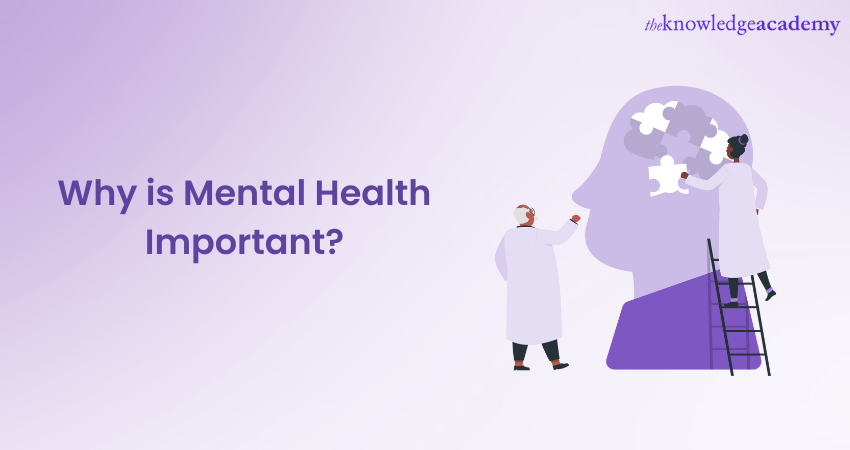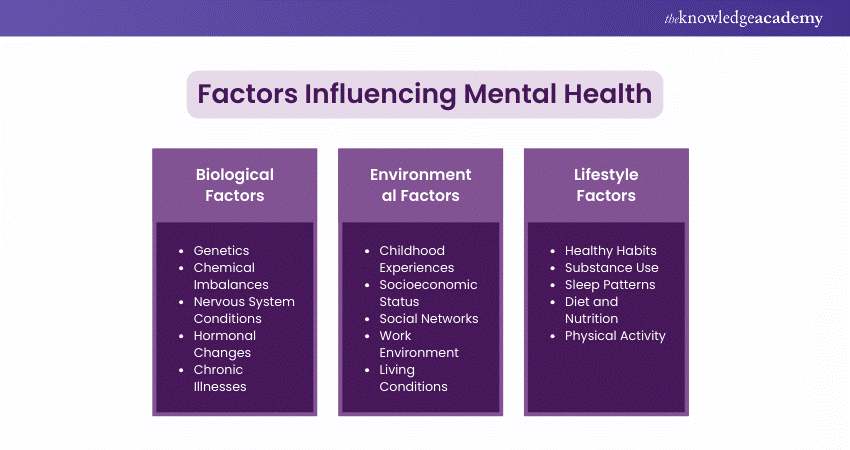We may not have the course you’re looking for. If you enquire or give us a call on +60 1800812339 and speak to our training experts, we may still be able to help with your training requirements.
Training Outcomes Within Your Budget!
We ensure quality, budget-alignment, and timely delivery by our expert instructors.

Mental health is a sensitive subject, and the data are rather shocking. The Centers for Disease Control and Prevention report that 20 per cent of adults encounter at least one Mental Health condition per year. This shows Why is Mental Health important and why Mental Health awareness and care should be prioritised.
Unfortunately, Mental Health is still not as openly embraced today as it should be. It is high time people accept Mental Health and find ways how to move beyond these barriers that hinder society from framing this issue or topic positively. Check this blog to understand Why is Mental Health Important and how it can make a difference.
Table of Contents
1) Understanding the importance of Mental Health
2) Factors influencing Mental Health
3) Consequences of neglecting Mental Health
4) Why should we promote Mental Health awareness?
5) Good Mental Health benefits
6) Conclusion
Understanding the Importance of Mental Health
Mental Health includes psychological, emotional, and social well-being. It includes positive mental well-being and is closely linked to physical health.
1) Impact on Physical Health: Poor mental well-being can negatively affect physical health by weakening the immune system and increasing the risk of chronic illnesses.
2) Benefits of Good Mental Well-Being:
a) Enhances cognitive abilities
b) Promotes emotional stability
c) Improves decision-making skills
d) Helps manage stress
e) Maintains healthy relationships
f) Contributes to overall fulfilment
3) Consequences of Untreated Mental Health Issues:
a) Impairs daily functioning
b) Affects concentration and emotions
c) Strains relationships
d) Reduces productivity
e) Decreases overall satisfaction
Understanding that mental health is dynamic and ever-changing encourages proactive self-care and seeking help when necessary.
Factors influencing Mental Health
Understanding the diverse Factors Affecting Mental Health is crucial for promoting well-being. Considering the significant range of factors affecting Mental Health, it is vital to address them thoroughly. Now let's explore these key factors in detail:

Biological factors
1) Genetics: Depression and anxiety can be hereditary, as individuals can inherit such traits from their parents or other close relatives.
2) Chemical Imbalances: Neural transmitters such as serotonin and dopamine in the brain influence a person’s mood and mental state.
3) Nervous System Conditions: Conditions like Alzheimer’s disease, epilepsy or multiple sclerosis can cause cognitive impairment, fluctuations in mood states or mood disorders.
4) Hormonal Changes: Physical conditions, emotions, stress, polluted environment, or changes in hormones like puberty, pregnancy, and menopausal state, for instance, may cause Mental Health issues.
5) Chronic Illnesses: People with chronic diseases such as diabetes, heart disease, and certain cancers are also prone to developing Mental Health problems.
Environmental Factors
1) Childhood Experiences: Adverse events like abuse, neglect, or loss of loved ones can have long-lasting effects on Mental Health.
2) Socioeconomic Status: Poverty, social inequality, and lack of access to healthcare and education can increase stress levels and impact Mental Health.
3) Social Networks: A supportive social network, healthy relationships, and a sense of connection can enhance Mental Health and coping abilities.
4) Work Environment: High-stress jobs, job insecurity, and poor work-life balance can negatively affect Mental Health.
5) Living Conditions: Unsafe or unstable living conditions, such as homelessness or living in a high-crime area, can increase stress and anxiety.
Lifestyle Factors
1) Healthy Habits: Practising mindfulness, engaging in hobbies, seeking therapy, regular exercise, adequate rest, and balanced nutrition support Mental Health by releasing endorphins and providing essential nutrients.
2) Substance Use: Alcohol and drug use can impact Mental Health, increase the risk of cognitive diseases, exacerbate existing conditions, and harm overall health.
3) Sleep Patterns: Poor sleep quality or irregular sleep patterns can affect mood and cognitive function.
4) Diet and Nutrition: A diet lacking essential nutrients can contribute to Mental Health issues, while a balanced diet can support brain function.
5) Physical Activity: Regular exercise can improve mood, reduce anxiety, and enhance overall mental well-being.
Learn to encourage mental wellbeing with our Mental Health and Wellbeing Training!
Consequences of neglecting Mental Health
Neglecting mental well-being can have profound consequences beyond the individual's well-being. Here are three key areas where neglected Mental Health can have a significant impact:
Increased risk of developing mental disorders
Not addressing Mental Health issues and not getting the proper support can raise the risk of developing mental disorders. If anxiety, depression, or other conditions are untreated, they can get worse, leading to severe and long-lasting symptoms. Without help, these disorders can mess with your daily life, limit how much you can get done, and bring down your overall quality of life.
Impact on physical health and chronic illnesses
Ignoring your Mental Health can negatively impact your physical health. The connection between your mind and body is strong - experiencing low mental well-being can result in various physical health problems. Constant stress due to untreated mental and emotional health problems can lower your immune system's defences, making you more susceptible to illness.
Effects on personal relationships and social functioning
Untreated Mental Health issues can strain relationships and hinder social functioning. They may lead to difficulty establishing and maintaining healthy connections, making participating in social activities and performing effectively in work or educational settings challenging. This can result in feelings of isolation and a reduced sense of belonging.
Struggling to manage anxiety? Find guidance with our Anxiety Course today!
Why Should we Promote Mental Health Awareness?
Dismantling Stigma:
1) Open Discussions: Encourages open conversations about Mental Health issues.
2) Eliminating Shame: Reduces the shame and fear often associated with poor Mental Health.
3) Facilitating Help-seeking: Encourages individuals to seek help when needed.
Cultivating a Supportive Culture:
1) Collaborative Efforts: Promotes a culture that values and supports mental health.
2) Positive Impact: Fosters an environment where Mental Health is prioritised and respected.
Early Recognition and Treatment:
1) Identifying Symptoms: Helps recognise signs and symptoms of Mental Health conditions.
2) Improving Treatment Success: Early diagnosis and treatment increase the chances of improvement of Mental Health.
3) Support from Professionals: Early intervention with professional support leads to better outcomes.
Good Mental Health Benefits
Regardless of an individual’s age, Mental Health is essential. When a person's mental well-being is negatively affected, it can result in negative behaviours. Here are some Benefits of Good Mental Health:
1) Enhances Cognitive Abilities
2) Promotes Emotional Stability
3) Improves Decision-making Skills
4) Aids in Stress Management
5) Supports Relationship Maintenance
6) Contributes to Overall Fulfilment
Conclusion
Understanding "Why is Mental Health Important" is crucial for overall well-being. Our mental and emotional health impacts every facet of our lives, including physical health and relationships. We can lead happier, healthier lives by recognising its multi-dimensional nature and taking proactive steps to prioritise our mental well-being. Let us all prioritise mental well-being and create a society that values and supports the mental well-being of every individual.
Build a foundation for emotional health with our Mindfulness Training!
Frequently Asked Questions

Mental Health is a significant issue today due to factors like increased social media use, the COVID-19 pandemic, and societal changes leading to isolation and stress. These elements have heightened anxiety, depression, and other Mental Health issues, making it necessary to address and support mental well-being.

Anorexia nervosa, an eating disorder, is the deadliest Mental Health illness. It possesses the highest fatality rate out of all mental disorders because of severe physical health issues and an elevated chance of committing suicide. This condition frequently results in long-term malnutrition, heart failure, and failure of multiple organs.

The Knowledge Academy takes global learning to new heights, offering over 30,000 online courses across 490+ locations in 220 countries. This expansive reach ensures accessibility and convenience for learners worldwide.
Alongside our diverse Online Course Catalogue, encompassing 19 major categories, we go the extra mile by providing a plethora of free educational Online Resources like News updates, Blogs, videos, webinars, and interview questions. Tailoring learning experiences further, professionals can maximise value with customisable Course Bundles of TKA.

The Knowledge Academy’s Knowledge Pass, a prepaid voucher, adds another layer of flexibility, allowing course bookings over a 12-month period. Join us on a journey where education knows no bounds.

The Knowledge Academy offers various Mental Health Courses, including Mental Health and Wellbeing Training, Mental Capacity Training and Mindfulness Training. These courses cater to different skill levels, providing comprehensive insights into the Importance of Safety at Workplace.
Our Health & Safety Blogs cover a range of topics related to Mental Health, offering valuable resources, best practices, and industry insights. Whether you are a beginner or looking to improve your mental health, The Knowledge Academy's diverse courses and informative blogs have got you covered.







 Top Rated Course
Top Rated Course




 If you wish to make any changes to your course, please
If you wish to make any changes to your course, please


